Britain
For over 900 years, concordats have proven so effective that they have formed the cornerstone of Vatican diplomacy. It all began with the Concordat of London. After Pope Alexander II blessed the Norman Invasion of England in 1066, he secured a quarter of the kingdom. However, when his successor, Gregory VII, further demanded that William the Conqueror pay fealty, this was firmly rebuffed. And when the papal legate of Paschal II tried to rule the country, he was chased out. However, the third bid for control proved successful when in 1107 Paschal finally managed to get the English to sign the world’s first concordat.
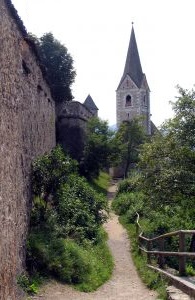 For more than four centuries this Vatican concordat bound England. But in 1534 when King Henry VIII made the Church of England the state religion, the concordat became a dead letter. Today the state church that replaced Catholicism still fields 26 bishops in the House of Lords of the United Kingdom. These Lords Spiritual and have the same voting privileges as the Lords Temporal and if they disapprove of a law passed by the elected members of the lower house, they can help to scuttle it. (The only other country to reserve seats in its legislature for clerics is Iran.)
For more than four centuries this Vatican concordat bound England. But in 1534 when King Henry VIII made the Church of England the state religion, the concordat became a dead letter. Today the state church that replaced Catholicism still fields 26 bishops in the House of Lords of the United Kingdom. These Lords Spiritual and have the same voting privileges as the Lords Temporal and if they disapprove of a law passed by the elected members of the lower house, they can help to scuttle it. (The only other country to reserve seats in its legislature for clerics is Iran.)
They exercise this power over the laws of the whole UK, even though only England has a state church. "The Church of England is not the established Church of the United Kingdom. The Church in Wales was disestablished in 1920, in Northern Ireland there has not been an established Church since 1871 and the Church of Scotland Act 1921 acknowledged that the Kirk had never been the established Church of Scotland and so could not be disestablished." (Nia Griffith, House of Commons debate, 10 July 2002)
The Church of England lives with the threat of future disestablishment, as it is now a minority religion. By 2011 weekly attendance at Church of England services had dwindled to about two percent of the population, leaving the churches largely empty. And six years later only 14% of people in England and Wales even identified with the state church. Among adults under the age of 24, it is 2%. A majority of the population say they have no religion. However, declining membership contrasts with its increasing financial assets, which in 2016 were listed as £7.9 billion.
Furthermore, this shrinking, highly unrepresentative and very wealthy church also has legal privileges far beyond its Bishops in the House of Lords. Like other religious bodies it is allowed to breach the 2010 Equality Act by only employing Christians and discriminating over sex, sexuality, marital history and gender identity if they conflict with “strongly held religious convictions”. This religious exemption to human rights standards has consequences in the view of the Bishop of Buckingham: “If the church were far more observant of the Equality Act, then deep structures of abuse, homophobia and sexism would not be embedded in the church in the way they are.”
The extent to which secrecy and influence-peddling is also embedded in the Church of England is revealed in a 2018 account of how all three branches of English law – police, CPS and judiciary – conspired over decades to protect Peter Ball, the notorious paedophile Bishop.
Yet, in theory, the head of this rich church that flouts human rights is endorsed by God. During the coronation the Archbishop of Canterbury daubs magic oil on the monarch. This is done under a canopy to shield from public view this strange meeting between God and the English king or queen.
Naturally, other religions are not convinced. Russian Orthodoxy, for instance, maintains that the Church was born of schism, and it still sends each new archbishop a routine anathema on his consecration — signed, ironically, “with best wishes” from the patriarch.
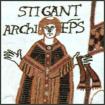 |
How the world's first concordat came about (documents and commentary) |
The agenda set forth in Gregory VII's secret memo, the Papal Dictation of 1075, finally bore fruit in the Concordat of London. Here are records of all three papal attempts to get control of Britain: ♦ Pope's demand of fealty rejected by William the Conqueror (text, c. 1075) | |
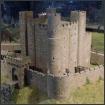 |
Prayer becomes a commodity controlled by the Church |
The Church taught that prayers could help save souls and also that they could be farmed out to holy men ― for a price. This gave the pope the leverage to acquire a quarter of the land in England, for the prayers of the clerics were seen as indispensible for king and country. Even William the Conqueror begs the pope: “Pray for us, and for the well-being of our realm”. Here is a short, revealing excerpt from Professor Terry Jones. | |
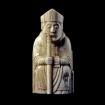 |
Most of Scotland is drawn under the English concordat (1188) |
After the Norman Conquest the Archbishop of York secured bishoprics in most of Scotland and this drew it under the 1107 Concordat of London. Then in 1188 the Scottish Church came under the pope. Only the islands of Orkney and Shetland remained part of the Norwegian bishopric, and this continued even after 1266 when the Norse king lost political control. Thus they were bound by the 1277 Norwegian Concordat until the Scottish church was formed in 1472. | |
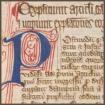 |
The Pope cancels the Magna Carta (1215) |
Even the earliest charter of civil rights was condemned by the papacy. This was the Magna Carta Libertatum or The Great Charter of the Liberties of England. Pope Innocent III had declared King John to be his vassal, and now "his" vassal had, without papal authorisation, granted rights to his subjects. The pope therefore considered the Magna Carta to be interference with his ownership of England and proclaimed it invalid ― "forever." | |
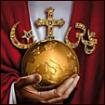 |
Religious courts in England |
England has several different kinds of ecclesiastical courts. These use religious law, such as the Islamic sharia, Jewish halakha and Christian canon law. Church of England courts are now restricted to internal church matters, but not the others. In 2012 a bill was put before the UK parliament that would forbid sharia courts to claim official sanction as arbitration tribunals. | |
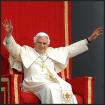 |
Papal pomp thanks to British taxpayers (2010) |
What did the Pope’s September 2010 trip cost Britain? Between the announcement of the Pope’s first state visit to Britain until he arrived half a year later, the projected costs that were acknowledged rose by about a half, while the Government tried to keep secret other expenses, including the enormous security bill. British taxpayers were obliged to foot most of the bill for a ceremony to move a 19th-century theologian one step closer to sainthood ― in the midst of brutal government austerity cuts. And to help pay for the Pope’s visit the UK Government quietly diverted money meant for the world’s poorest people. |














